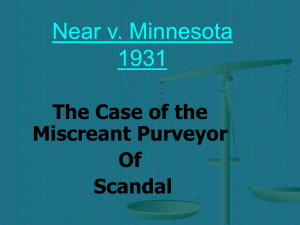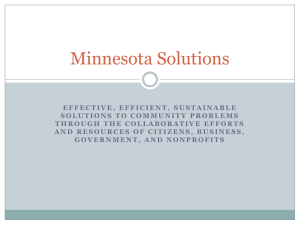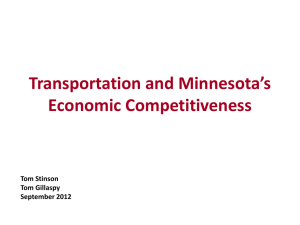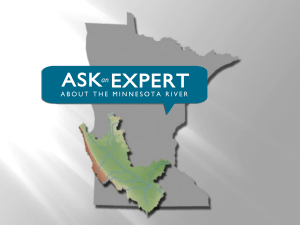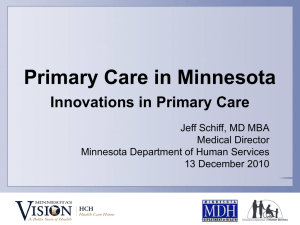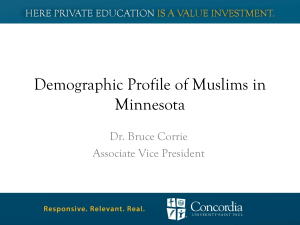Homeschool Basics Fact Sheet 3
advertisement
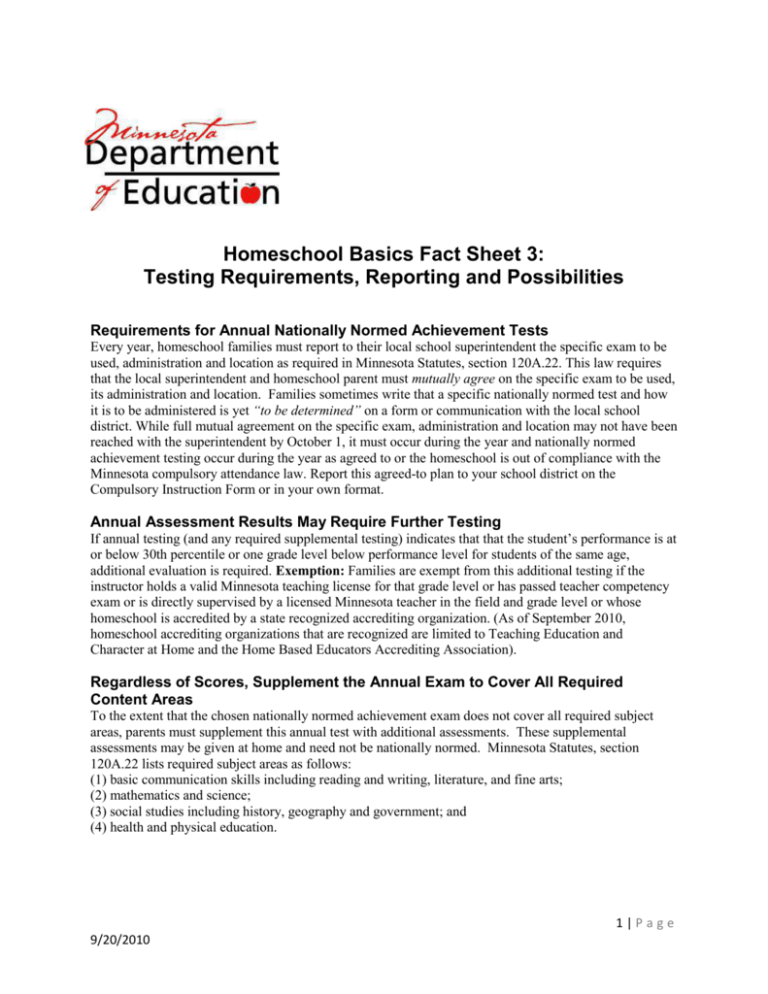
Homeschool Basics Fact Sheet 3: Testing Requirements, Reporting and Possibilities Requirements for Annual Nationally Normed Achievement Tests Every year, homeschool families must report to their local school superintendent the specific exam to be used, administration and location as required in Minnesota Statutes, section 120A.22. This law requires that the local superintendent and homeschool parent must mutually agree on the specific exam to be used, its administration and location. Families sometimes write that a specific nationally normed test and how it is to be administered is yet “to be determined” on a form or communication with the local school district. While full mutual agreement on the specific exam, administration and location may not have been reached with the superintendent by October 1, it must occur during the year and nationally normed achievement testing occur during the year as agreed to or the homeschool is out of compliance with the Minnesota compulsory attendance law. Report this agreed-to plan to your school district on the Compulsory Instruction Form or in your own format. Annual Assessment Results May Require Further Testing If annual testing (and any required supplemental testing) indicates that that the student’s performance is at or below 30th percentile or one grade level below performance level for students of the same age, additional evaluation is required. Exemption: Families are exempt from this additional testing if the instructor holds a valid Minnesota teaching license for that grade level or has passed teacher competency exam or is directly supervised by a licensed Minnesota teacher in the field and grade level or whose homeschool is accredited by a state recognized accrediting organization. (As of September 2010, homeschool accrediting organizations that are recognized are limited to Teaching Education and Character at Home and the Home Based Educators Accrediting Association). Regardless of Scores, Supplement the Annual Exam to Cover All Required Content Areas To the extent that the chosen nationally normed achievement exam does not cover all required subject areas, parents must supplement this annual test with additional assessments. These supplemental assessments may be given at home and need not be nationally normed. Minnesota Statutes, section 120A.22 lists required subject areas as follows: (1) basic communication skills including reading and writing, literature, and fine arts; (2) mathematics and science; (3) social studies including history, geography and government; and (4) health and physical education. 1|Page 9/20/2010 University of Minnesota Testing Center The University of Minnesota Testing Center provides Iowa Basics exams and other guidance. Minnesota Statewide Testing Program University of Minnesota 879 29th Avenue S.E. Room 103 Minneapolis, MN 55414-284 Linda Rogers, Office Supervisor, roger009@umn.edu, 612-626-1803 BUROS Center For Testing BUROS Center for Testing is a test review organization that may provide a helpful source of obtaining appropriate examinations for specific needs. Buros Center for Testing University of Nebraska-Lincoln 21 Teachers College Hall Lincoln, NE 68588-0348 402-472-6203, phone 402-475-6207, fax College-Level Examination Program Tests The College-Level Examination Program® (CLEP) gives homeschool families the opportunity to receive college credit for what homeschoolers already know by earning qualifying scores on any of 34 examinations. The program means homeschoolers can gain college credit for knowledge acquired through independent study, prior course work, on-the-job training, professional development, cultural pursuits, or internships. CLEP exams are administered throughout the year at over 1,400 colleges and universities in the United States and abroad. Once a homeschooler has identified a convenient test center, contact that site directly for information about registration, scheduling, and fees. In addition to the exam fee, most test centers charge a nonrefundable administration fee directly payable to the institution. How CLEP Helps Homeschoolers: Saves time. Depending on a particular college's CLEP policy, a satisfactory score on a CLEP exam can earn a student from 3 to 12 college credits. Saves money. The cost of a CLEP exam is a fraction of the tuition and fees for the corresponding course. Makes college more interesting. CLEP can help homeschoolers skip general introductory courses and move on to more advanced classes, or explore new and challenging academic areas. Satisfies a proficiency requirement. CLEP can help homeschoolers demonstrate their ability in college math or a world language. How to Get Started Find out if the homeschooler’s college of choice accepts CLEP. Use the CLEP college search tool and talk to the college’s admissions office, test center, or academic advisor. Read descriptions of all 34 exams and decide which to take. Register to take the desired exam(s) by contacting a CLEP test center and making an appointment. Start studying. Get college textbooks and review sample questions. Take the test. 2|Page 9/20/2010 State of Minnesota Standardized Exams Homeschool families may take Minnesota’s standardized assessments. However, these tests are not nationally normed so they do not fulfill the annual homeschool testing requirement. Districts are charged a small fee to give the exam to nonpublic students and usually pass this fee along to homeschool families; much higher fees apply for late testing or rescored exams. (Pay attention to the dates public school students are testing to save costs.) Contact your resident school district to request participation. If your goal is to have your student ultimately re-enter a Minnesota public school and graduate with a Minnesota public high school diploma, then all Graduation-Required Assessments for Diploma (GRAD) tests must be taken and passed before that public diploma can be awarded. The Graduation-Required Assessments for Diploma (GRAD) is a component of the Reading and Math MCA-IIs given in the high school. Passing the GRAD component is one way to fulfill Minnesota’s high school graduation requirement for students who first entered grade 8 in 2005-06 or later. The GRAD components measure student performance on Writing, Reading and Mathematics skills that are essential for success in the 21st century. If a student does not satisfy the graduation requirement during the first administration of an assessment, there will be retest opportunities. The Minnesota Comprehensive Assessments—Series II (MCA-IIs) are the state tests that help districts measure student progress in mathematics, reading and science toward Minnesota's academic standards. Although these tests relate to the federal No Child Left Behind law, homeschoolers may take them and their results will not impact a public school’s rating related to federal and state standards. Students who score at the Meet or Exceed Standards achievement level on the high school Reading and Math MCA-IIs satisfy the assessment requirement for graduation from a Minnesota public school. The Basic Skills Tests (BSTs). Most of the students graduating under the BST rule graduated in 2009. The Minnesota Test of Academic Skills (MTAS) is Minnesota’s alternate assessment based on alternate achievement standard in reading, writing, mathematics and science. The MTAS is part of the statewide assessment program and measures the extent to which students with significant cognitive disabilities are making progress in the general curriculum. 3|Page 9/20/2010 NOVEMBER 2010109 2010-11 Minnesota State Testing Calendar November 2010 2 GRAD Writing Retest Grades 10-12 MARCH 2011 March 2011 7 ELL Testing Begins 25 ELL Testing Ends 28 MTAS Reading, Math, and Science Begins MCA Mathematics Grades 3–8 Online Begins MCA-Modified Mathematics Grades 5–8 Online Begins MCA Science Testing Begins APRIL 2011 April 2011 11 MCA Paper and Pencil Reading and Math Grades 3–8 Begins MCA-Modified Reading Grades 5–8 Begins 12 MCA and MCA-Modified Paper and Pencil Reading and Math Grades 10 and 11: Segments 1 and 22 GRAD Writing Grade 9 13 MCA and MCA-Modified Paper and Pencil Reading and Math Grades 10 and 11: Segments 3 and 4 19 GRAD Writing Retest (Seniors Only) 29 MCA Paper and Pencil Reading and Math Grades 3–8 Ends MCA-Modified Reading Grades 5–8 Ends MTAS Reading and Math Ends MAY 2011 May 2011 20 MCA Mathematics Grades 3–8 Online Ends MCA-Modified Mathematics Grades 5–8 Online Ends MCA Science Ends MTAS Science Ends JULY 20111 July 2011 19 GRAD Writing Retest Grades 10-12 4|Page 9/20/2010 Common Achievement Tests Used in Minnesota Public Schools Here is a list of achievement exams also often used by Minnesota public school systems, however they are not all nationally normed. The list is provided to homeschool families as an idea-starter on tests they may consider and, perhaps, discuss with their local school superintendents. Not all are appropriate for the nationally normed achievement test requirement. Multilevel Academic Survey Test (MAST) American School Achievement Tests-Advanced National Educational Development Tests Battery National Proficiency Survey Series-Science and American School Achievement Tests-Arithmetic Social Studies Readiness Sequential Tests of Educational Progress (Step III) American School Achievement Tests-Intermediate Sequential Tests of Educational Progress-Preprimary Battery A (Step III-Circus) Basic Achievement Skills Individual Screener (BASIS) Sequential Tests of Educational Progress-Preprimary Basic Skills Assessment B (Step III-Circus) California Achievement Tests-5th Ed (CAT/5) Sequential Tests of Educational Progress-Primary C Comprehensive Tests of Basic Skills (Step III-Circus) Cooperative Primary Tests Sequential Tests of Educational Progress-Primary D Curriculum Frameworks Assessment System (Step III-Circus) Curriculum Referenced Test of Mastery (CRTM) SRA Achievement Series-1978 Ed-Forms 1and2Diagnostic Achievement Test for Adolescents 2nd Ed Level A-H (DATA-2) SRA Survey of Basic Skills-levels 20-34 Fundamental Achievement Series-Form B SRA Survey of Basic Skills-levels 34-37 Iowa Tests of Basic Skills (ITBS) Stanford Achievement Test-Advanced 1 Form S-9th Iowa Tests of Educational Development (ITED) Ed/10th Ed. Metropolitan Achievement Tests-Elementary 1 Stanford Achievement Test-Advanced 2 Form S-9th (MAT8) Ed/10th Ed. Metropolitan Achievement Tests-Elementary 2 Stanford Achievement Test-Intermediate 1 Form S-9th (MAT8) Ed/10th Ed. Metropolitan Achievement Tests-Intermediate 1 Stanford Achievement Test-Intermediate 2 Form S-9th (MAT8) Ed/10th Ed. Metropolitan Achievement Tests-Intermediate 2 Stanford Achievement Test-Primary 1 Form S-9th (MAT8) Ed/10th Ed. Metropolitan Achievement Tests-Intermediate 3 Stanford Achievement Test-Primary 2 Form S-9th (MAT8) Ed/10th Ed. Metropolitan Achievement Tests-Intermediate 4 Stanford Early School Achievement Test-Level 2 (MAT8) Stanford Test of Academic Skills (TASK) Metropolitan Achievement Tests-Preprimer 1 (MAT8) Stanford Test of Academic Skills (TASK) Metropolitan Achievement Tests-Primary 1 (MAT8) TerraNova (CTBS) Metropolitan Achievement Tests-Primary 2 (MAT8) TerraNova Second Edition (CAT6) Metropolitan Achievement Tests-Primer (MAT8) Test of Academic Performance (TAP) Metropolitan Achievement Tests-Secondary 1 (MAT8) Tests of Achievement and Proficiency (TAP) Metropolitan Achievement Tests-Secondary 2 (MAT8) Tests of Adult Basic Education (TABE) Metropolitan Achievement Tests-Secondary 3 (MAT8) Three-R's Test (3-R'S) Metropolitan Achievement Tests-Secondary 4 (MAT8) Wechsler Individual Achievement Test Metropolitan Achievement Tests-Special Report Wide Range Achievement Test 3 (WRAT 3) Mini-Battery of Achievement Young Children's Achievement Test 200 The Minnesota Department of Education is unable to provide further information on appropriate tests than is provided here; homeschool families need to explore options that are acceptable to their superintendents 5|Page 9/20/2010 and meet the law’s requirements of a nationally normed reference test. Please note that no testing exemptions exist for special needs children. Internet Resources Minnesota Department of Education (MDE): Go to the MDE website at education.state.mn.us, then click on School Choice in the navigation bar, then, on the next navigation bar that appears, Homeschooling, to download related fact sheets and Compulsory Instruction Form: Homeschool Basics Fact Sheet 1: Introduction to Homeschooling in Minnesota Homeschool Basics Fact Sheet 2: Reporting Requirements Unrelated to Testing. Homeschool Basics Fact Sheet 4: Public School Opportunities and State Programs Homeschool Basics Fact Sheet 5: Financial Considerations Homeschool Basics Fact Sheet 6: Community Resources Compulsory Instruction Form Go to the MDE website at education.state.mn.us, then click on Academic Excellence, then College and Career Readiness, then College Level Exam Program (CLEP) for more information about college credit by examination. Laws: Read the full text of a key statute that is referenced in this document by visiting the Minnesota Revisor of Statutes website at revisor.leg.state.mn.us and typing in the particular statute number in the “Retrieve by Number” tool on the left column of the page: Minnesota Statutes, section 120A.22, Compulsory Instruction University of Minnesota Testing Center: http://oms.umn.edu/oms/mstp/ Buros Center for Testing: www.unl.edu/buros/bimm/index.html College Level Exam Progam (CLEP): http://www.collegeboard.com/student/testing/clep/about.html Teaching Education and Character At Home homeschool accrediting agency: www.teachinstitute.org/accredit.html Home Based Educators Accrediting Association: www.hbeaa.org Questions Your first point of contact with questions and concerns is the homeschool liaison in your local public school district. The homeschool liaison is most often an employee who works in the superintendent’s office. If you have questions that cannot be answered at the local level, the Minnesota Department of Education contact is Cindy Jackson, School Choice Ombudsman, cindy.s.jackson@state.mn.us, 651-582-8572. 6|Page 9/20/2010


